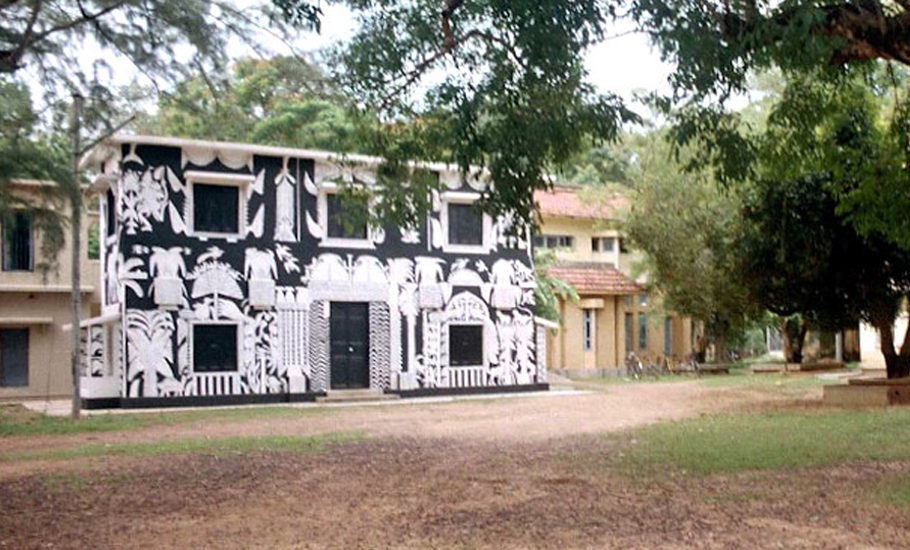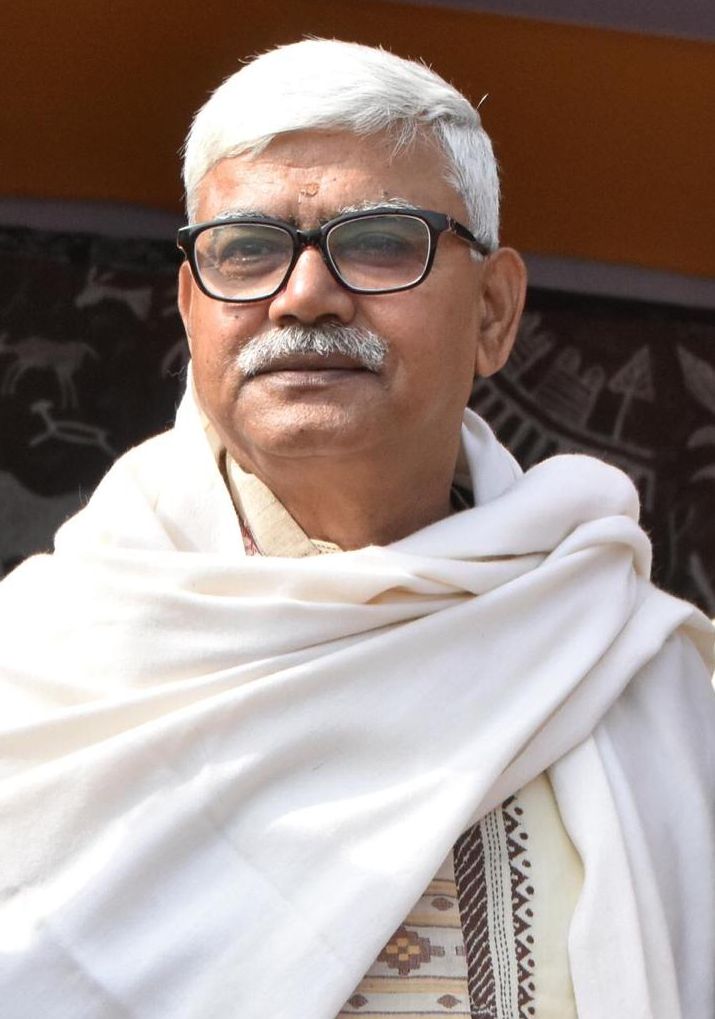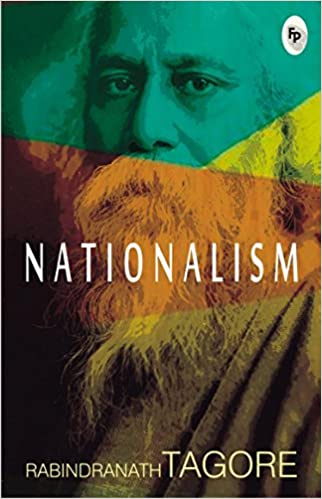
- Home
- News
- Analysis
- States
- Perspective
- Videos
- Education
- Entertainment
- Elections
- World Cup 2023
- Features
- Health
- Business
- Series
- Economy Series
- Earth Day
- Kashmir’s Frozen Turbulence
- India@75
- The legend of Ramjanmabhoomi
- Liberalisation@30
- How to tame a dragon
- Celebrating biodiversity
- Farm Matters
- 50 days of solitude
- Bringing Migrants Home
- Budget 2020
- Jharkhand Votes
- The Federal Investigates
- The Federal Impact
- Vanishing Sand
- Gandhi @ 150
- Andhra Today
- Field report
- Operation Gulmarg
- Pandemic @1 Mn in India
- The Federal Year-End
- The Zero Year
- Premium
- Science
- Brand studio
- Home
- NewsNews
- Analysis
- StatesStates
- PerspectivePerspective
- VideosVideos
- Entertainment
- ElectionsElections
- Sports
- Loading...
Sports - Features
- BusinessBusiness
- Premium
- Loading...
Premium

What ails Tagore's abode of peace, Santiniketan?
Beneath the veneer of soothing vista of mango grove, Rabindranath Tagore's Visva Bharati University in Shantiniketan is gradually slipping into an abyss.

Beneath the veneer of a soothing vista of mango groves, paths flanked by bakula and sal trees, chirping of birds and blooming of wide variants of flowers, the Visva Bharati University is gradually slipping into an abyss of decadence. Conceived by Rabindranath Tagore as a centre for unconventional education in close communion with nature, the university is frequently hitting the headlines for...
Beneath the veneer of a soothing vista of mango groves, paths flanked by bakula and sal trees, chirping of birds and blooming of wide variants of flowers, the Visva Bharati University is gradually slipping into an abyss of decadence.
Conceived by Rabindranath Tagore as a centre for unconventional education in close communion with nature, the university is frequently hitting the headlines for all the wrong reasons even as its position under the Ministry of Education’s National Institutional Ranking Framework (NIRF) has been steadily sliding for the past few years.
Earlier in mid-August, violent protests erupted in the heritage university campus at Santiniketan in Bolpur, some 180km north of Kolkata. The trigger for the latest controversy was the decision of the university authorities to construct a boundary wall in an adjoining open ground of the institution where a winter fair — Poush Mela — is held every year.
Only a month earlier the university’s executive council in an emergency meeting had decided to scrap the annual winter event started by the poet’s father Debendranath Tagore citing bitter experiences of the last two years to make the traders comply with National Green Tribunal (NGT) guidelines.
The fair commences on the 7th day of Bengali month of Poush (December-January) and lasts for six days, providing a forum for the locals to showcase and sell their unique handicraft, handloom materials, locally-made toys and foods. Another key attraction of the fair is the live performances of Bengali folk music, such as baul, kirtan and kabigan.
Tagore envisaged the annual event as a bridge for the varsity’s socio, economic and cultural interactions with its neighbouring tribal villages. This bridge-building started with Tagore adopting around 50 villages around Santiniketan, the abode of peace, where he set up the varsity in 1921.
The poet deployed volunteers to impart vocational and skill development training to these villages so that they could become self reliant. As part of this endeavour, he promoted the fair as a social milieu for interactions and bonhomie of people from diverse socio, economic and religious backgrounds.
Poush in peril?
The university’s announcement of being “ill-equipped” to host the annual event was viewed by many as a shift from the ethos on which Tagore wanted to develop the institution. They remind that Tagore had established the Visva-Bharati on the precept that it would be in communion with nature and would mingle with its human surroundings.
The university’s highest decision making body in the meeting had also decided not to organise the ‘Basanta Utsav’ the spring festival that coincides with Holi. Visva Bharati Vice-Chancellor Bidyut Chakrabarty termed the festival as “Basanta Tandav (Spring calamity).”
For locals these annual events also happened to be a major source of earnings as people from around the world throng Santiniketan during these cultural extravaganzas. According to one estimate the daily tourist foot fall to the university town increases to around 40,000 during Poush Mela from a meagre 3,500 on normal days.
The simmering discontent over the university’s decision erupted in violence when an attempt was made to put up the wall around the ground. A mob allegedly led by ruling Trinamool Congress functionaries vandalised the construction site, making a mockery of the town’s name Santiniketan.
The university in a police complaint stated that a few “hundred hooligans” led by TMC MLA Naresh Bauri and other party leaders, including councillors entered the ground and “completely demolished gates, pillars of the university and its camp office by excavator brought by them.”
A member of the Bolpur Byabsayee Samity, Sunil Sinha said, “The university authority is putting up the wall as part of its plan to stop organising Poush Mela and Basant Utsav. But people of Bolpur will not allow this to happen.”
“Four security, walls are being erected in various places on the campus. But I don’t understand the reason behind fencing Poush Mela ground with a wall. I don’t support this,” educationist Supriyo Tagore told local media. He is one of the great-grandsons of Rabindranath Tagore’s elder brother Satyendranath Tagore.
Chief minister Mamata Banerjee too had conveyed that the state government was against the construction of the boundary wall.
Under pressure, the central university softened its stand saying it will organise the fair, provided it gets financial help from the Union government. The turnaround came close on the heels of BJP leader and Rajya Sabha MP Swapan Dasgupta suggesting that the central government should organise the fair as it is not possible for the university to organise an event of such a vast magnitude on its own.

On the contrary
The vice-chancellor in a missive addressed to faculties, students and other stakeholders of the university on August 22 stated that the contention of the construction of the wall being contrary to the Visva Bharati’s tradition, was unfounded.
He pointed out that even in the past walls were erected to protect the university properties and to stop “unsavoury and even dangerous activities (like gambling, drinking of alcohol, sexual activities, including prostitutions).”
He further went on to add that the fencing around the ground was to ensure “adequate security and an academic ambience of our students.”
“No special interest of any business lobby and no threats from miscreants can stop an educational institution from exercising this right,” he added.
In July in another missive, the VC raised the serious issue of encroachment of the university land and unauthorised construction around the campus. He said three villages had come up on the institution’s land, making it probably the only university in the world that houses three villages within its campus.
“In addition to these mass encroachments by the tribals, immigrants, slum dwellers, there are many examples of individual encroachments by well-to-do people and even those who are on the payroll of Visva Bharati,” the VC alleged.
This administrative wrangling is part of a greater malice, alleged the Visva-Bharati Student Unity, the largest student forum of the varsity.
‘Anti-nationalism’
Since assuming charge in 2018, the current VC started imposing certain alien ideology, claimed Falguni Pan, a spokesperson of the Students Unity.
He was alluding to allegations that the VC was promoting “saffronisation of the campus.” They have reasons to believe so.
On Republic Day this year, a second-year undergraduate student of modern history Bijju Sarkar was expelled from the hostel for shooting and circulating a video of a speech by the vice-chancellor. In the video clip the VC was heard saying those opposing the CAA (Citizenship Amendment Acts) are reading out the Preamble (of the Constitution). But this Constitution was adopted with minority votes. 293 persons created it sitting in the Constituent Assembly.”
He was further heard saying, “The Preamble has turned into Veda. But if we, the voters who elect the Parliament, dislike it, we will change it. However, exchanging abuses is not the way to go about the change.”
A student from Bangladesh received a “leave India” notice for posting photographs of an anti-Citizenship Amendment Act protest on social media.
There are many more such instances that clearly point at the university’s inclination towards a particular political ideology which is inimical to Tagore’s ideals of humanism. Significantly, the Shiksha Sanskriti Utthan Nyas, the education wing of the RSS headed by Dinanath Batra has called for removal of Tagore’s philosophy on nationalism and patriotism from NCERT text books.

The Hindu right wing groups are against Tagore’s concept as the poet had famously said: “Patriotism cannot be our final spiritual shelter; my refuge is humanity. I will not buy glass for the price of diamonds, and I will never allow patriotism to triumph over humanity as long as I live.”
Scarred past
To blame the university’s present dispensation for its downfall will however be a travesty. For the last several years the university has been frequently embroiled in controversy. In 2004, Rabindranath Tagore’s 1913 Nobel prize medal was stolen from the campus. Soon after another scandal hit the institution when its vice-chancellor Dilip Sinha, and a lecturer Mukti Deb were arrested by the CID on charges of forgery.
Deb was appointed on the basis of forged mark sheets and certificates attested by Sinha.
A few years later a girl student of the university was shot dead by a spurned lover at a hostel on the university campus.
A reign of terror had descended on Tagore’s abode of peace, noted historian and former vice chancellor of the University Rajat Kanta Ray alleged in a letter to the then Prime Minister Manmohan Singh in 2012.
The Prime Minister is the chancellor of the university.
Ray had made the damning allegations against his successor Sushanta Duttagupta, who had allegedly transferred, suspended and sacked employees in large numbers.
In 2014, three students of the university were arrested for allegedly stripping, molesting and filming a junior student.
Then there is trade unionism that further puts spanner in the university’s smooth functioning and progress. Strangely, in one instance teachers of the VB’s Sangeet Bhavan ceased work demanding overtime payment for singing at university functions.
“It’s painful to see the gradual decline of the university, because it is not just an institution. It’s an idea nurtured so passionately by Tagore himself,” said Anusua Roy Choudhury, who had taught there for a short stint.
This decline is visible in the NIRF ranking. This year it ranked 50 among all Indian universities, 13 notches below its last year’s position of 37. It ranked 11 in 2016, 19 in 2017 and 31 in 2018, as per the NIRF assessment.

